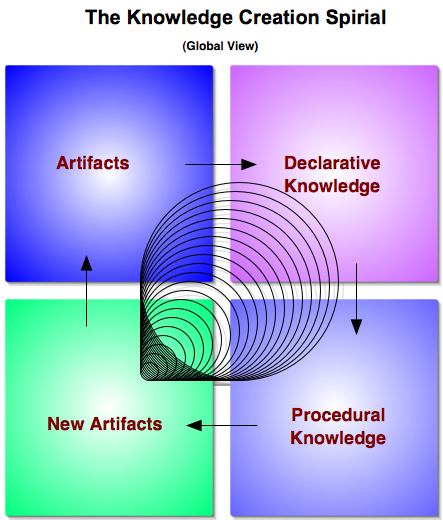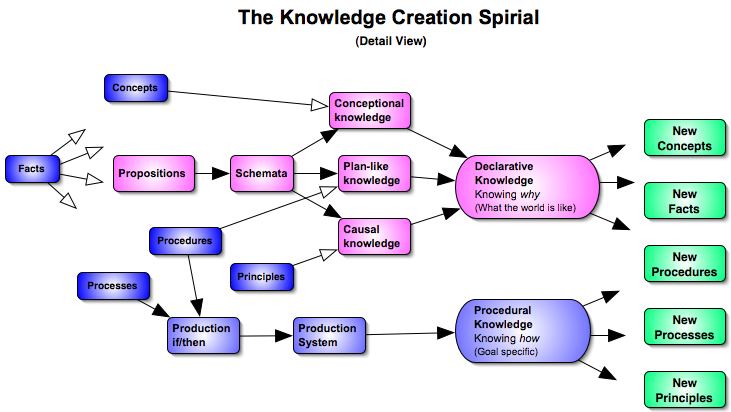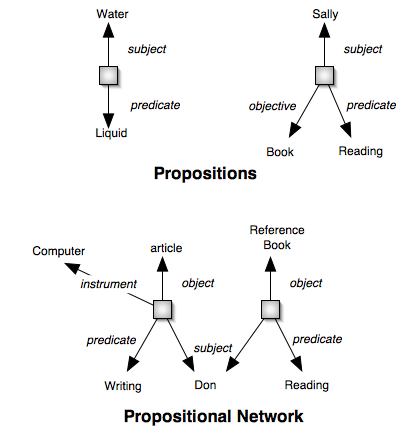Learning With Artifacts
@tags:: #lit✍/📰️article/highlights
@links::
@ref:: Learning With Artifacts
@author:: knowledgejump.com
2024-01-30 knowledgejump.com - Learning With Artifacts

Reference
Notes
Knowledge often comes to us via transcribed content or artifacts, which is derived from other's knowledge.
- No location available
-
Thus, artifacts are used in the learning process for creating knowledge, while in turn, knowledge creates new artifacts.
- No location available
-
Content
- No location available
-
Facts
- No location available
-
Specific and unique data or instance.
- No location available
-
Concepts
- No location available
-
A class of items, words, or ideas that are known by a common name, includes multiple specific examples, shares common features. There are two types of concepts: concrete and abstract.
- No location available
-
Processes
- No location available
-
A flow of events or activities that describe how things work rather than how to do things. There are normally two types: business processes that describe work flows and technical processes that describe how things work in equipment or nature. They can be thought of as the big picture, of how something works.
- No location available
-
Procedures
- No location available
-
A series of step-by-step actions and decisions that result in the achievement of a task. There are two types of actions: linear and branched.
- No location available
-
Principles
- No location available
-
Guidelines, rules, and parameters that govern. It includes not only what should be done, but also what should not be done.
- No location available
-
Principles allow one to make predictions and draw implications.
- No location available
-
Principles are the basic building blocks of causal models or theoretical models (theories).
- No location available
-
Knowledge Creation Spirial
- No location available
-
- [note::
 ]
]
Declarative Knowledge
- No location available
-
Declarative models refers to representations of objects and events and how these knowledge and events are related to other objects and events. They focus on the why rather than the how.
- No location available
-
Propositions
- No location available
-
Declarative knowledge is based on propositions that consist of a predicate or relationship and at least one argument, such as water is liquid or computers are dumb. A predicate can be more detailed, such as Sally is reading a book (Sally is the subject, book is the object, and read is the predicate).
- No location available
-
Propositions can, in turn, become propositional networks that contain a number of interrelated facts, such as, "Don is reading a reference book while writing this article on a computer" (Merrienboer, 1997).
- No location available
-
- [note:: ]
]
Cognitive Schemata
- No location available
-
Schemata are higher-level cognitive units that use propositional networks as their building blocks. These are often abstract or general nature that allow us to classify objects or events as belonging to a particular class and to reason about them.
- No location available
-
Conceptional Knowledge
- No location available
-
Concepts are simple schemata that represent a class of objects, events, or other entities by their characteristic features. Concepts enable a person to identify or classify particular instances (concrete object or event) as belonging to a particular class.
- No location available
-
Experts possess more powerful concepts in their domain than novices that help them to solve problems. These concepts give them patterns for labeling various memory states, which allow them to classify problems according to their solution mode or deep structure. Where as novices typically classify problems according to their surface structure or superficial feature.
- No location available
-
- [note::Experts classify problems according to their "solution mode"/"deep structure"
Novices classify problems according to their surface structure or superficial features.]
Plan-Like Knowledge (Scripts)
- No location available
-
These are simple schemata that describe how goals are related in time or space. They allow us to understand events and organize functions and actions.
- No location available
-
Causal Knowledge
- No location available
-
Causal knowledge are complex schemata that link principles and concepts with each other to form cause-effect relationships. They allow us to interpret events, give explanations, and make predictions.
- No location available
-
Procedural Knowledge
- No location available
-
Procedural models focus on tasks that must be performed to reach a particular objective or goal. It is characterized as knowing how.
- No location available
-
Productions
- No location available
-
Productions are the building blocks of procedural knowledge and are composed of a condition and an action or IF and THEN statement. For example, IF the light is red, THEN stop (Merrienboer, 1997).
- No location available
-
Production Systems
- No location available
-
(highlight:: A production system is a set of productions for cognitive processing. It is characterized by the recognize-act cycle in which one production leads to another production. For example:
IF the light is red, THEN stop
IF light turns green, THEN release brake
IF brake is released, THEN step on gas pedal)
- No location available
-
Thus, in a training environment, knowledge is mainly composed of declarative knowledge, while skills are mainly composed of procedural knowledge.
- No location available
-
New highlights added 2024-01-30 at 3:20 PM
Knowledge often comes to us via transcribed content or artifacts, which is derived from other's knowledge. ... Thus, artifacts are used in the learning process for creating knowledge, while in turn, knowledge creates new artifacts.
- No location available
-
New highlights added 2024-01-30 at 4:20 PM
Artifacts also relate to Karl Popper's Three Worlds of Knowledge, particularly the third world that consists of artifacts, such as books, tools, theories, models, libraries, computers, and networks.
- No location available
-